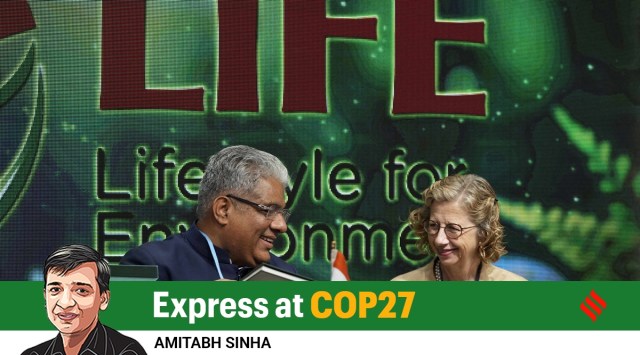- India
- International
Don’t ask developing nations to act, let developed ones reach net zero by 2030: India at COP27
All scientific assessments suggest that the current action plans of the countries will not be able to deliver the kind of emission cuts required to keep global temperatures from rising beyond 1.5 degree Celsius from pre-industrial times.
 Union minister Bhupender Yadav with UNEP executive director Inger Andersen at the COP27 summit, Monday. (PTI)
Union minister Bhupender Yadav with UNEP executive director Inger Andersen at the COP27 summit, Monday. (PTI)India on Monday said developing countries must not be asked to continuously upgrade their climate actions, and any further measures required to meet the global goals of keeping temperature below 1.5 degree Celsius must come from the developed countries alone.
“Developed countries should aim to achieve the net zero emissions status not in 2050, but by 2030,” India’s environment minister Bhupendra Yadav said, adding that “The opportunities for ambition (of climate actions) vary across parties (countries). This, we must recognise. If not, our efforts to increase ambition from those who have very little to give will only result in inaction.”
Yadav was speaking at the first ministerial roundtable to discuss further actions that can be taken before 2030 to make deeper emission cuts. This roundtable was mooted at previous year’s climate meeting in Glasgow.
All scientific assessments suggest that the current action plans of the countries will not be able to deliver the kind of emission cuts required to keep global temperatures from rising beyond 1.5 degree Celsius from pre-industrial times.
Yadav, however, argued that this gap was mainly because of the failure of the developed countries to meet their targets in the previous decades. To compensate, developed countries should achieve a net-zero status not in 2050, but by 2030.

“The title of our roundtable itself must be understood. Pre-2030 must be clarified. How far back does pre-2030 go? In our view, pre-2030 in this sense is no different from pre-2020. It is the historical cumulative emissions before a given year that measures responsibility. So our consideration must include pre-2020 responsibility and whether those commitments had been fulfilled. It cannot begin at 2020,” Yadav argued.
“Our understanding is that the Annex-I parties have not met their pre-2020 commitments together, and several individually as well. So pre-2030 ambition must be measured in terms of whether countries are staying within their fair share of the carbon budget, taking note of both the historical period and in the future. By this scientific criterion, some developed countries must reach net zero even before 2030 and 2050 is not enough,” he said.
Yadav also reminded the developed nations that increasing ambition of climate actions would involve public involvement, and leaving everything to be accomplished by the market forces would not yield much.
Yadav also argued that it was important to target the “right sectors” for making increased emission cuts. “To target small farmers for mitigation in the name of ambition will be a serious mistake,” he said.
Apr 24: Latest News
- 01
- 02
- 03
- 04
- 05







































